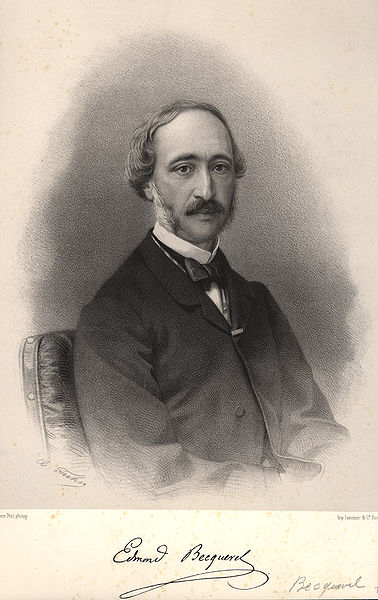<Back to Index>
- Physicist Alexandre Edmond Becquerel, 1820
- Painter Annie Caroline Pontifex Fernhout Toorop, 1891
- United States Senator (NY) Rufus King, 1755
PAGE SPONSOR
ΕΚΛΟΓΕΣ 2012
Τυπώστε και Ψηφίστε

Alexandre-Edmond Becquerel (24 March 1820 – 11 May 1891) was a French physicist who studied the solar spectrum, magnetism, electricity, and optics. He is known for his work in luminescence and phosphorescence. He is credited with the discovery of the photovoltaic effect, the operating principle of the solar cell, in 1839. He was the son of Antoine César Becquerel and the father of Henri Becquerel.
Becquerel was born in Paris, and was in turn the pupil, assistant and successor of his father at the Musee d'Histoire Naturelle. He was also appointed professor at the short lived Agronomic Institute at Versailles in 1849, and in 1853 received the chair of physics at the Conservatoire des Arts et Metiers. Becquerel was associated with his father in much of his work, but he himself paid special attention to the study of light, investigating the photochemical effects and spectroscopic characters of solar radiation and the electric light, and the phenomena of phosphorescence, particularly as displayed by the sulfides and by compounds of uranium. It was in connection with these latter inquiries that he devised his phosphoroscope, an apparatus which enabled the interval between exposure to the source of light and observation of the resulting effects to be varied at will and accurately measured.
Becquerel published in 1867 - 1868 a treatise in two volumes called La Lumière, ses causes et ses effets. He also investigated the diamagnetic and paramagnetic properties of substances; and was keenly interested in the phenomena of electrochemical decomposition, accumulating much evidence in favor of Faraday's law of electrolysis and proposing a modified statement of it which was intended to cover certain apparent exceptions.
He was elected a member of the Royal Swedish Academy of Sciences in 1886.